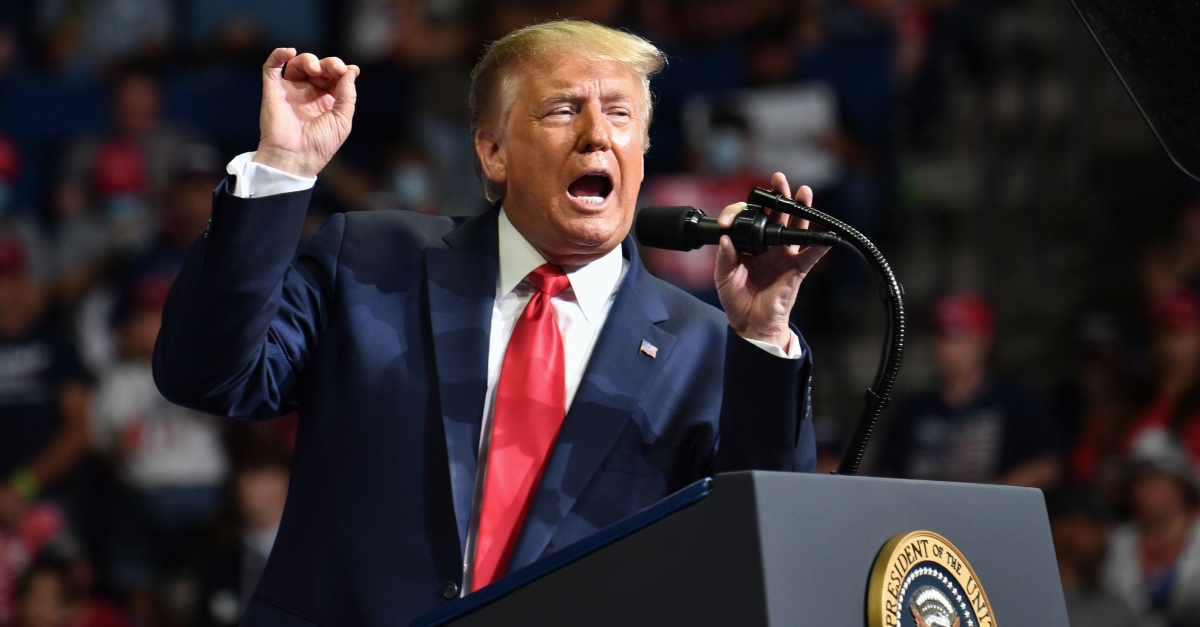
Months after a federal appellate court dismissed an emoluments lawsuit against President Donald Trump for lack of standing, more than 200 Democratic members of Congress have formally petitioned the Supreme Court to hear their case.
The petition for a writ of certiorari asked the Supreme Court to resolve a lone standing-related question:
Do legislators have standing to seek judicial relief when their votes have been “completely nullified,” Raines v. Byrd, 521 U.S. 811, 823 (1997)?
Democrats maintain that President Trump has been violating the Constitution since day one of his presidency by personally profiting off of foreign governments without congressional consent.
“Since the eighteenth century, U.S. presidents and other federal officials have obeyed the Clause’s mandate by declining to accept rewards from foreign states without prior consent,” the petition began. “President Trump, however, has been violating this critical constitutional prohibition for his entire term in office. By maintaining ownership of his companies while they conduct business with foreign governments—without seeking or obtaining congressional consent for these transactions—the President is accepting unauthorized financial benefits from foreign states.”
The lawmakers argued that Raines actually does allow them to seek judicial relief, making the Supreme Court’s review of this matter “imperative”:
But since this Court first recognized institutional injuries as cognizable in Coleman v. Miller, 307 U.S. 433 (1939), it has been careful not to foreclose all standing for individual members of Congress. Instead, even as it has clarified that individual members enjoy standing to sue only in narrow circumstances, it has preserved their ability to seek judicial relief in at least one situation: when their votes have been “completely nullified.” Raines, 521 U.S. at 823. That is the case here. By refusing to seek congressional consent before accepting payments and other benefits from foreign governments, President Trump is denying Petitioners their right to cast specific votes on whether he may accept those benefits and to have their votes given effect.
The court of appeals, however, short-circuited this analysis with its categorical new rule. Because its shallow treatment of legislative standing departs from this Court’s precedent, and because its decision undermines key safeguards of our constitutional structure, review by this Court is imperative.
In February, the U.S Court of Appeals for the District of Columbia Circuit dismissed the emoluments-related lawsuit filed by members of Congress against the president. The court said that the 215 Members of the Congress failed the Article III standing test:
The Members can, and likely will, continue to use their weighty voices to make their case to the American people, their colleagues in the Congress and the President himself, all of whom are free to engage that argument as they see fit. But we will not—indeed we cannot—participate in this debate. The Constitution permits the Judiciary to speak only in the context of an Article III case or controversy and this lawsuit presents neither.
“Here, regardless of rigor, our conclusion is straightforward because the Members—29 Senators and 186 Members of the House of Representatives—do not constitute a majority of either body and are, therefore, powerless to approve or deny the President’s acceptance of foreign emoluments,” the D.C. Circuit continued.
The D.C. Circuit notably featured the Supreme Court’s Raines precedent prominently in its decision, saying, “This case is really no different from Raines.”
“The Members were not singled out—their alleged injury is shared by the 320 members of the Congress who did not join the lawsuit—and their claim is based entirely on the loss of political power,” the February ruling said.
Democrats claim that the D.C. Circuit didn’t “engage with” the district court’s ruling, which said that their case was “entirely different” from Raines.
Because President Trump is denying members of Congress an institutional prerogative to which the Constitution entitles them—the right to cast effective votes on whether he may accept specific foreign emoluments before he accepts them—Petitioners filed suit, seeking declaratory and injunctive relief preventing the President from accepting foreign emoluments without first obtaining congressional consent. In a thorough opinion, the district court held that Petitioners have Article III standing, explaining that “the President’s complete nullification of plaintiffs’ votes is entirely different from the ‘abstract dilution of legislative power’ alleged in Raines [v. Byrd, 521 U.S. 811 (1997)].” Pet. App. 46 (quoting Raines, 521 U.S. at 826).
The court of appeals reversed but did not engage with the district court’s analysis. Instead, in a cursory opinion, the court of appeals held that under Raines “only an institution can assert an institutional injury,” and that Petitioners lack standing because they “do not constitute a majority” of the House or Senate. Id. at 10-11. This new rule misunderstands the concept of “institutional injury” articulated in Raines. And based on that misunderstanding, it categorically prevents individual members of Congress from enforcing any of their institutional prerogatives in court
Read the petition below:
Democrats ask SCOTUS to hear emoluments case by Law&Crime on Scribd
[Image via NICHOLAS KAMM_AFP via Getty Images]